Critical Evaluation: Cultural & HRM Issues for UK Call Centre in Japan
VerifiedAdded on 2022/11/25
|12
|3319
|276
Report
AI Summary
This report provides a critical evaluation of the cultural and human resource management (HRM) issues that UK companies must consider when establishing call centre operations in Japan. It delves into cultural aspects such as adapting to the local market, managing across cultures, and understanding local legal and ethical considerations, including stakeholder conflicts and relevant IHRM models like the Harvard and Warwick models. The report also addresses key HRM challenges, including compliance with Japanese laws, management changes, leadership development, workforce training, compensation issues, recruiting and retaining talented employees, and workforce diversity and innovation. The analysis highlights the importance of understanding cultural nuances and implementing effective HRM strategies to ensure the successful establishment and operation of call centres in the Japanese market, helping UK companies to mitigate risks and enhance their performance.
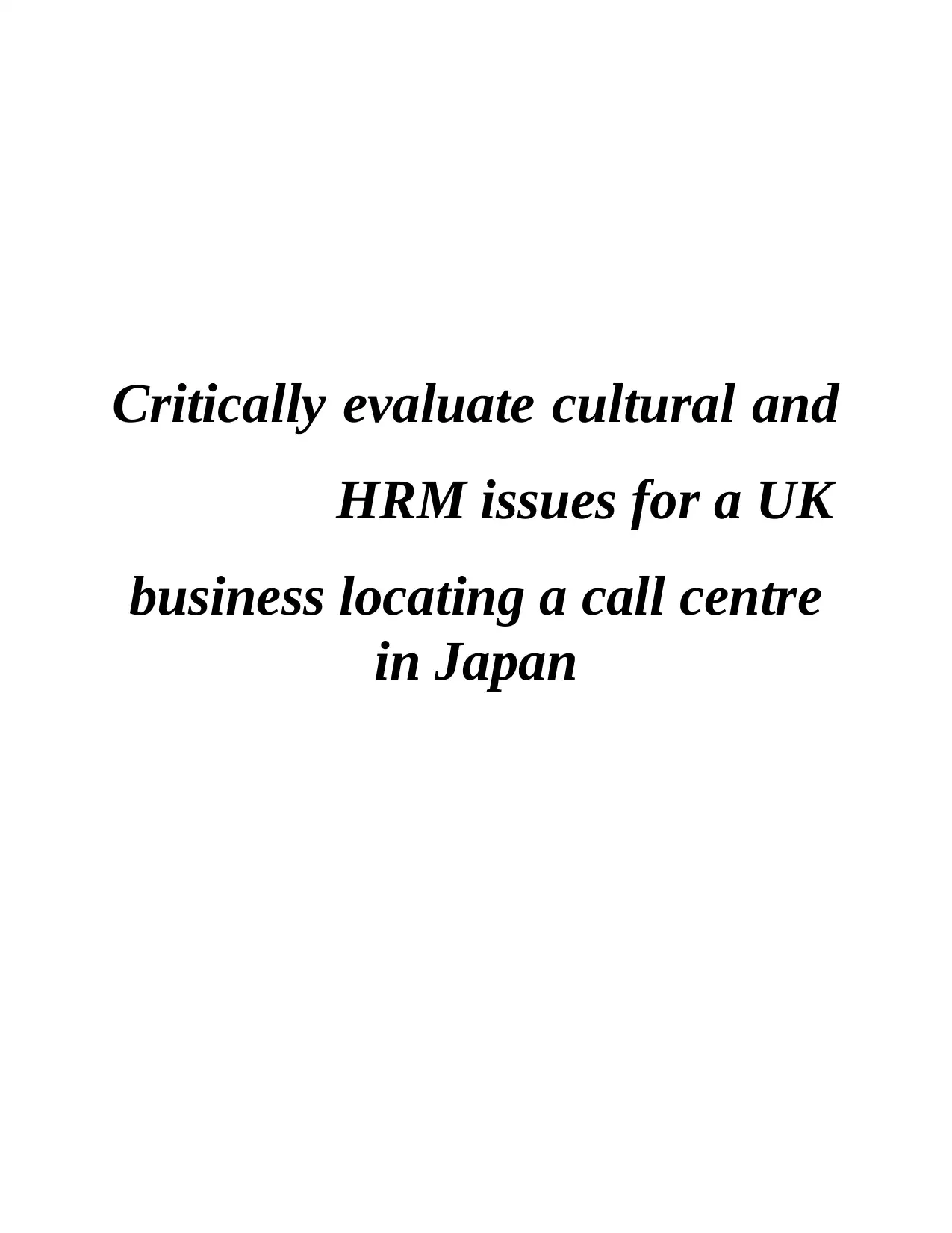
Critically evaluate cultural and
HRM issues for a UK
business locating a call centre
in Japan
HRM issues for a UK
business locating a call centre
in Japan
Paraphrase This Document
Need a fresh take? Get an instant paraphrase of this document with our AI Paraphraser
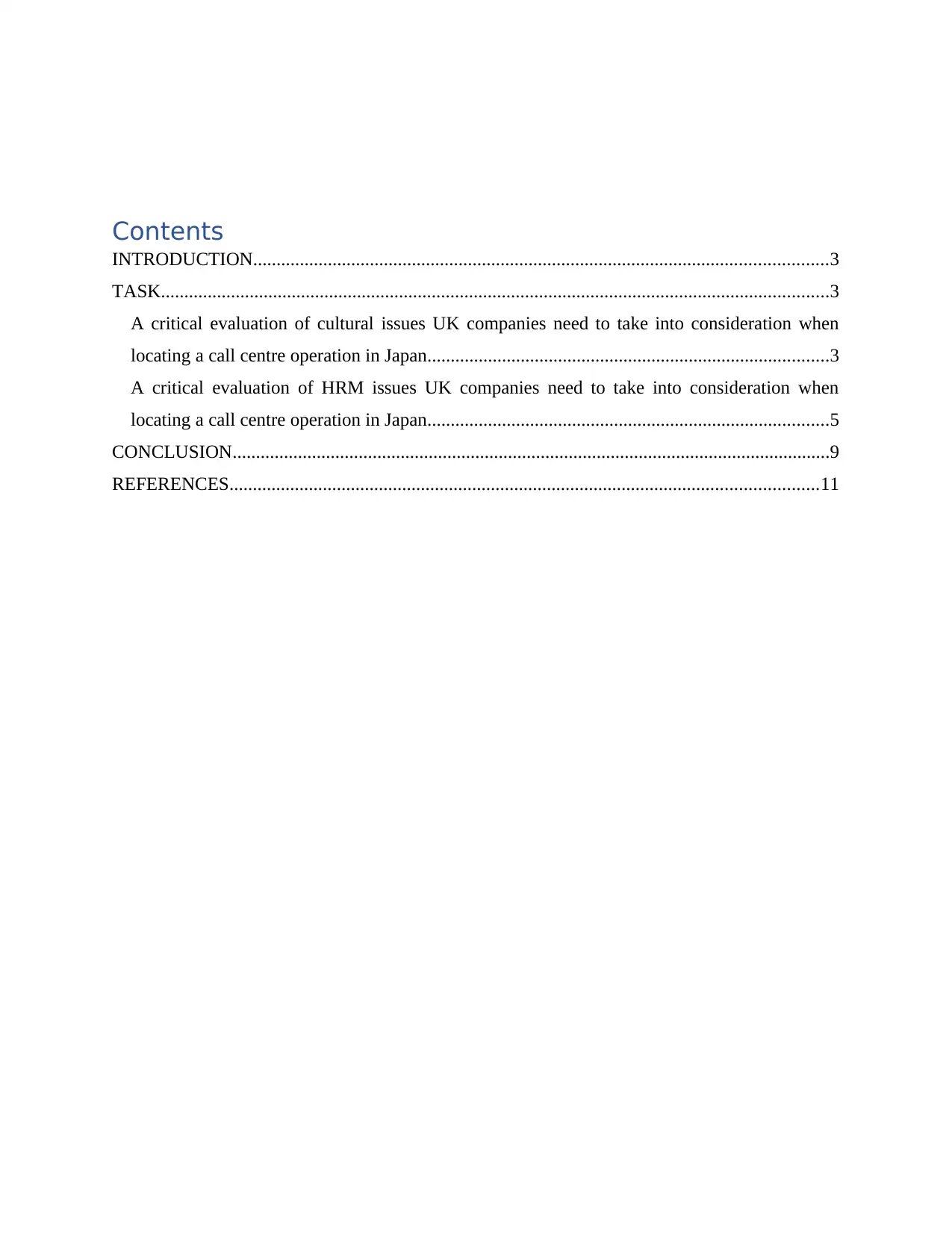
Contents
INTRODUCTION...........................................................................................................................3
TASK...............................................................................................................................................3
A critical evaluation of cultural issues UK companies need to take into consideration when
locating a call centre operation in Japan......................................................................................3
A critical evaluation of HRM issues UK companies need to take into consideration when
locating a call centre operation in Japan......................................................................................5
CONCLUSION................................................................................................................................9
REFERENCES..............................................................................................................................11
INTRODUCTION...........................................................................................................................3
TASK...............................................................................................................................................3
A critical evaluation of cultural issues UK companies need to take into consideration when
locating a call centre operation in Japan......................................................................................3
A critical evaluation of HRM issues UK companies need to take into consideration when
locating a call centre operation in Japan......................................................................................5
CONCLUSION................................................................................................................................9
REFERENCES..............................................................................................................................11
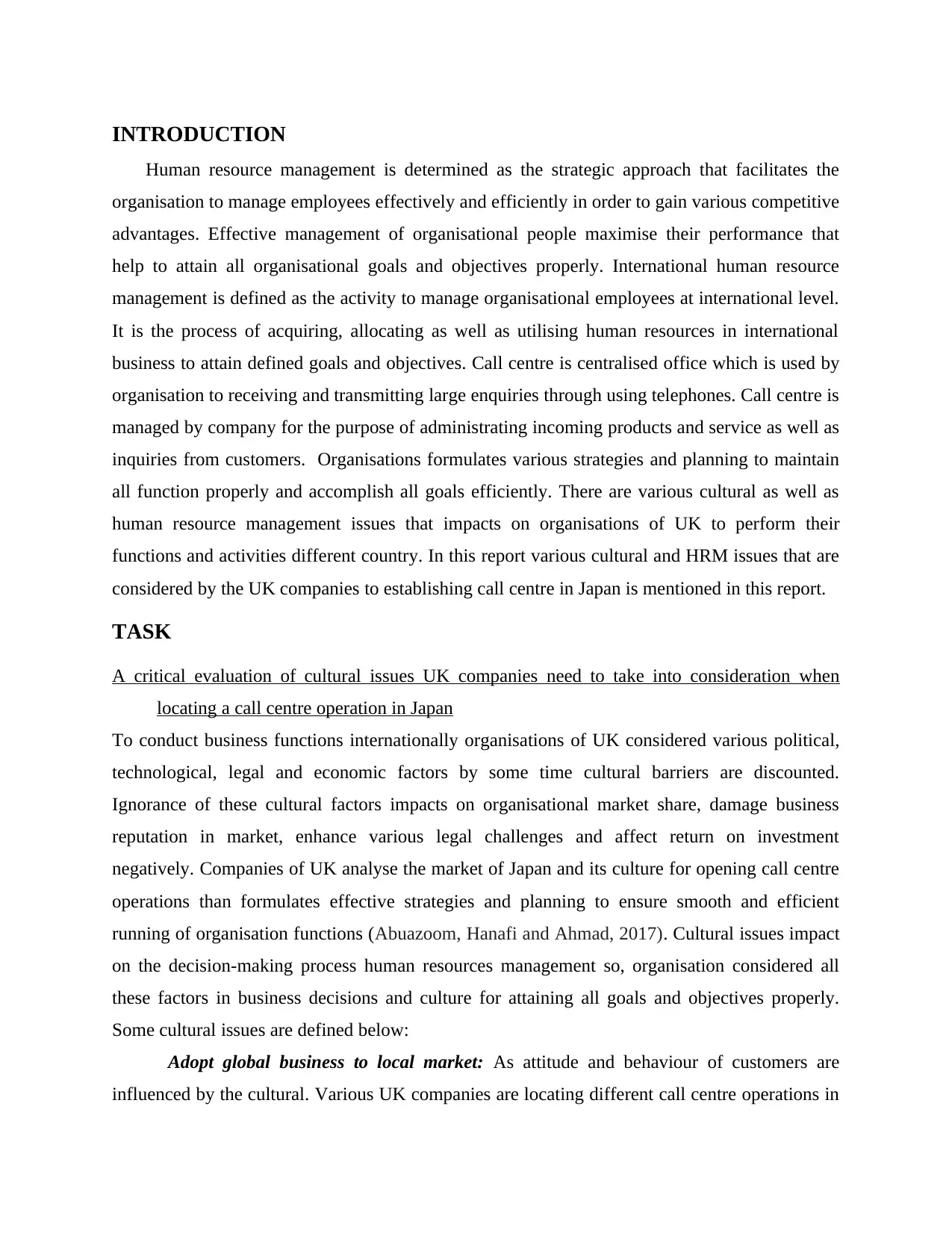
INTRODUCTION
Human resource management is determined as the strategic approach that facilitates the
organisation to manage employees effectively and efficiently in order to gain various competitive
advantages. Effective management of organisational people maximise their performance that
help to attain all organisational goals and objectives properly. International human resource
management is defined as the activity to manage organisational employees at international level.
It is the process of acquiring, allocating as well as utilising human resources in international
business to attain defined goals and objectives. Call centre is centralised office which is used by
organisation to receiving and transmitting large enquiries through using telephones. Call centre is
managed by company for the purpose of administrating incoming products and service as well as
inquiries from customers. Organisations formulates various strategies and planning to maintain
all function properly and accomplish all goals efficiently. There are various cultural as well as
human resource management issues that impacts on organisations of UK to perform their
functions and activities different country. In this report various cultural and HRM issues that are
considered by the UK companies to establishing call centre in Japan is mentioned in this report.
TASK
A critical evaluation of cultural issues UK companies need to take into consideration when
locating a call centre operation in Japan
To conduct business functions internationally organisations of UK considered various political,
technological, legal and economic factors by some time cultural barriers are discounted.
Ignorance of these cultural factors impacts on organisational market share, damage business
reputation in market, enhance various legal challenges and affect return on investment
negatively. Companies of UK analyse the market of Japan and its culture for opening call centre
operations than formulates effective strategies and planning to ensure smooth and efficient
running of organisation functions (Abuazoom, Hanafi and Ahmad, 2017). Cultural issues impact
on the decision-making process human resources management so, organisation considered all
these factors in business decisions and culture for attaining all goals and objectives properly.
Some cultural issues are defined below:
Adopt global business to local market: As attitude and behaviour of customers are
influenced by the cultural. Various UK companies are locating different call centre operations in
Human resource management is determined as the strategic approach that facilitates the
organisation to manage employees effectively and efficiently in order to gain various competitive
advantages. Effective management of organisational people maximise their performance that
help to attain all organisational goals and objectives properly. International human resource
management is defined as the activity to manage organisational employees at international level.
It is the process of acquiring, allocating as well as utilising human resources in international
business to attain defined goals and objectives. Call centre is centralised office which is used by
organisation to receiving and transmitting large enquiries through using telephones. Call centre is
managed by company for the purpose of administrating incoming products and service as well as
inquiries from customers. Organisations formulates various strategies and planning to maintain
all function properly and accomplish all goals efficiently. There are various cultural as well as
human resource management issues that impacts on organisations of UK to perform their
functions and activities different country. In this report various cultural and HRM issues that are
considered by the UK companies to establishing call centre in Japan is mentioned in this report.
TASK
A critical evaluation of cultural issues UK companies need to take into consideration when
locating a call centre operation in Japan
To conduct business functions internationally organisations of UK considered various political,
technological, legal and economic factors by some time cultural barriers are discounted.
Ignorance of these cultural factors impacts on organisational market share, damage business
reputation in market, enhance various legal challenges and affect return on investment
negatively. Companies of UK analyse the market of Japan and its culture for opening call centre
operations than formulates effective strategies and planning to ensure smooth and efficient
running of organisation functions (Abuazoom, Hanafi and Ahmad, 2017). Cultural issues impact
on the decision-making process human resources management so, organisation considered all
these factors in business decisions and culture for attaining all goals and objectives properly.
Some cultural issues are defined below:
Adopt global business to local market: As attitude and behaviour of customers are
influenced by the cultural. Various UK companies are locating different call centre operations in
⊘ This is a preview!⊘
Do you want full access?
Subscribe today to unlock all pages.

Trusted by 1+ million students worldwide
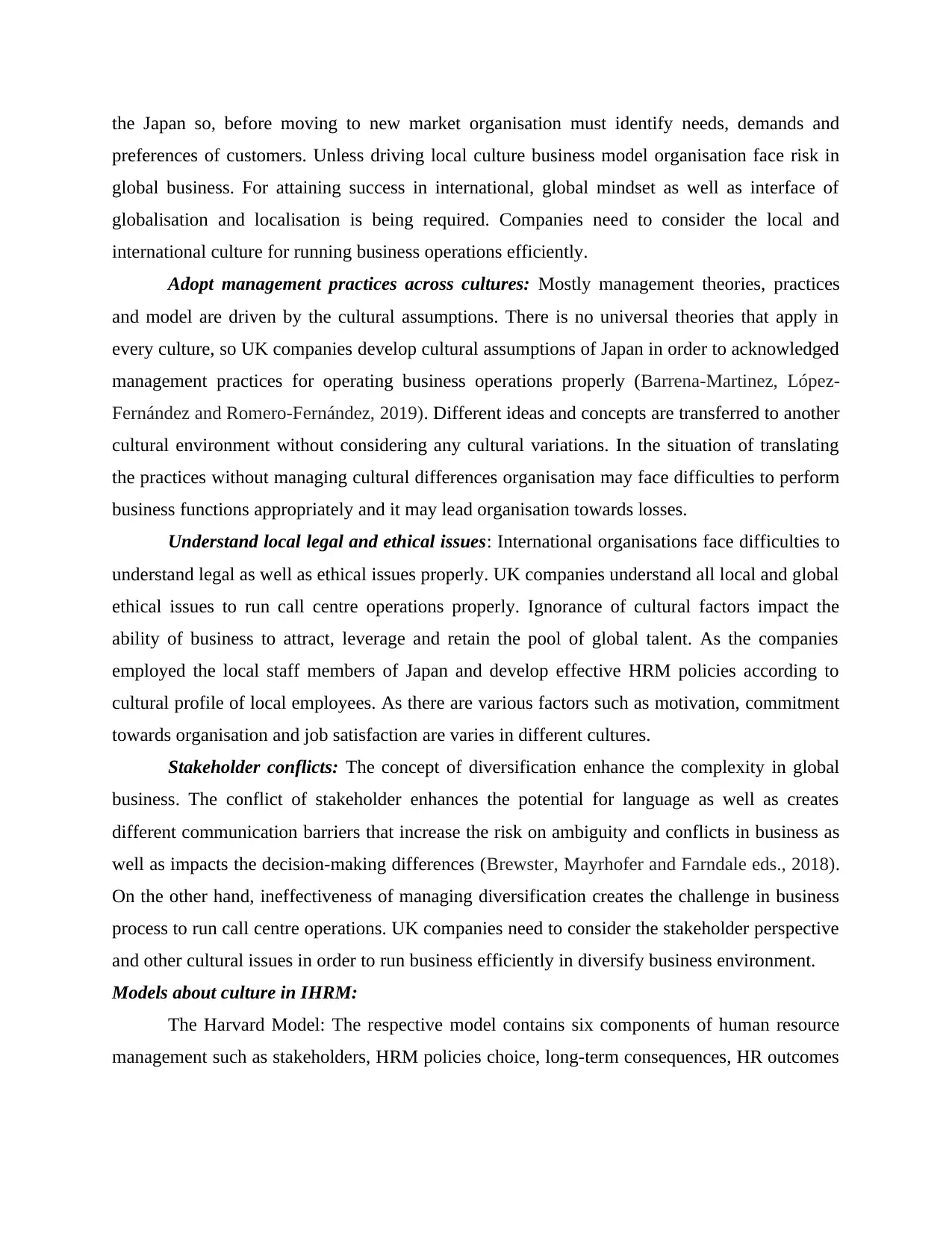
the Japan so, before moving to new market organisation must identify needs, demands and
preferences of customers. Unless driving local culture business model organisation face risk in
global business. For attaining success in international, global mindset as well as interface of
globalisation and localisation is being required. Companies need to consider the local and
international culture for running business operations efficiently.
Adopt management practices across cultures: Mostly management theories, practices
and model are driven by the cultural assumptions. There is no universal theories that apply in
every culture, so UK companies develop cultural assumptions of Japan in order to acknowledged
management practices for operating business operations properly (Barrena-Martinez, López-
Fernández and Romero-Fernández, 2019). Different ideas and concepts are transferred to another
cultural environment without considering any cultural variations. In the situation of translating
the practices without managing cultural differences organisation may face difficulties to perform
business functions appropriately and it may lead organisation towards losses.
Understand local legal and ethical issues: International organisations face difficulties to
understand legal as well as ethical issues properly. UK companies understand all local and global
ethical issues to run call centre operations properly. Ignorance of cultural factors impact the
ability of business to attract, leverage and retain the pool of global talent. As the companies
employed the local staff members of Japan and develop effective HRM policies according to
cultural profile of local employees. As there are various factors such as motivation, commitment
towards organisation and job satisfaction are varies in different cultures.
Stakeholder conflicts: The concept of diversification enhance the complexity in global
business. The conflict of stakeholder enhances the potential for language as well as creates
different communication barriers that increase the risk on ambiguity and conflicts in business as
well as impacts the decision-making differences (Brewster, Mayrhofer and Farndale eds., 2018).
On the other hand, ineffectiveness of managing diversification creates the challenge in business
process to run call centre operations. UK companies need to consider the stakeholder perspective
and other cultural issues in order to run business efficiently in diversify business environment.
Models about culture in IHRM:
The Harvard Model: The respective model contains six components of human resource
management such as stakeholders, HRM policies choice, long-term consequences, HR outcomes
preferences of customers. Unless driving local culture business model organisation face risk in
global business. For attaining success in international, global mindset as well as interface of
globalisation and localisation is being required. Companies need to consider the local and
international culture for running business operations efficiently.
Adopt management practices across cultures: Mostly management theories, practices
and model are driven by the cultural assumptions. There is no universal theories that apply in
every culture, so UK companies develop cultural assumptions of Japan in order to acknowledged
management practices for operating business operations properly (Barrena-Martinez, López-
Fernández and Romero-Fernández, 2019). Different ideas and concepts are transferred to another
cultural environment without considering any cultural variations. In the situation of translating
the practices without managing cultural differences organisation may face difficulties to perform
business functions appropriately and it may lead organisation towards losses.
Understand local legal and ethical issues: International organisations face difficulties to
understand legal as well as ethical issues properly. UK companies understand all local and global
ethical issues to run call centre operations properly. Ignorance of cultural factors impact the
ability of business to attract, leverage and retain the pool of global talent. As the companies
employed the local staff members of Japan and develop effective HRM policies according to
cultural profile of local employees. As there are various factors such as motivation, commitment
towards organisation and job satisfaction are varies in different cultures.
Stakeholder conflicts: The concept of diversification enhance the complexity in global
business. The conflict of stakeholder enhances the potential for language as well as creates
different communication barriers that increase the risk on ambiguity and conflicts in business as
well as impacts the decision-making differences (Brewster, Mayrhofer and Farndale eds., 2018).
On the other hand, ineffectiveness of managing diversification creates the challenge in business
process to run call centre operations. UK companies need to consider the stakeholder perspective
and other cultural issues in order to run business efficiently in diversify business environment.
Models about culture in IHRM:
The Harvard Model: The respective model contains six components of human resource
management such as stakeholders, HRM policies choice, long-term consequences, HR outcomes
Paraphrase This Document
Need a fresh take? Get an instant paraphrase of this document with our AI Paraphraser
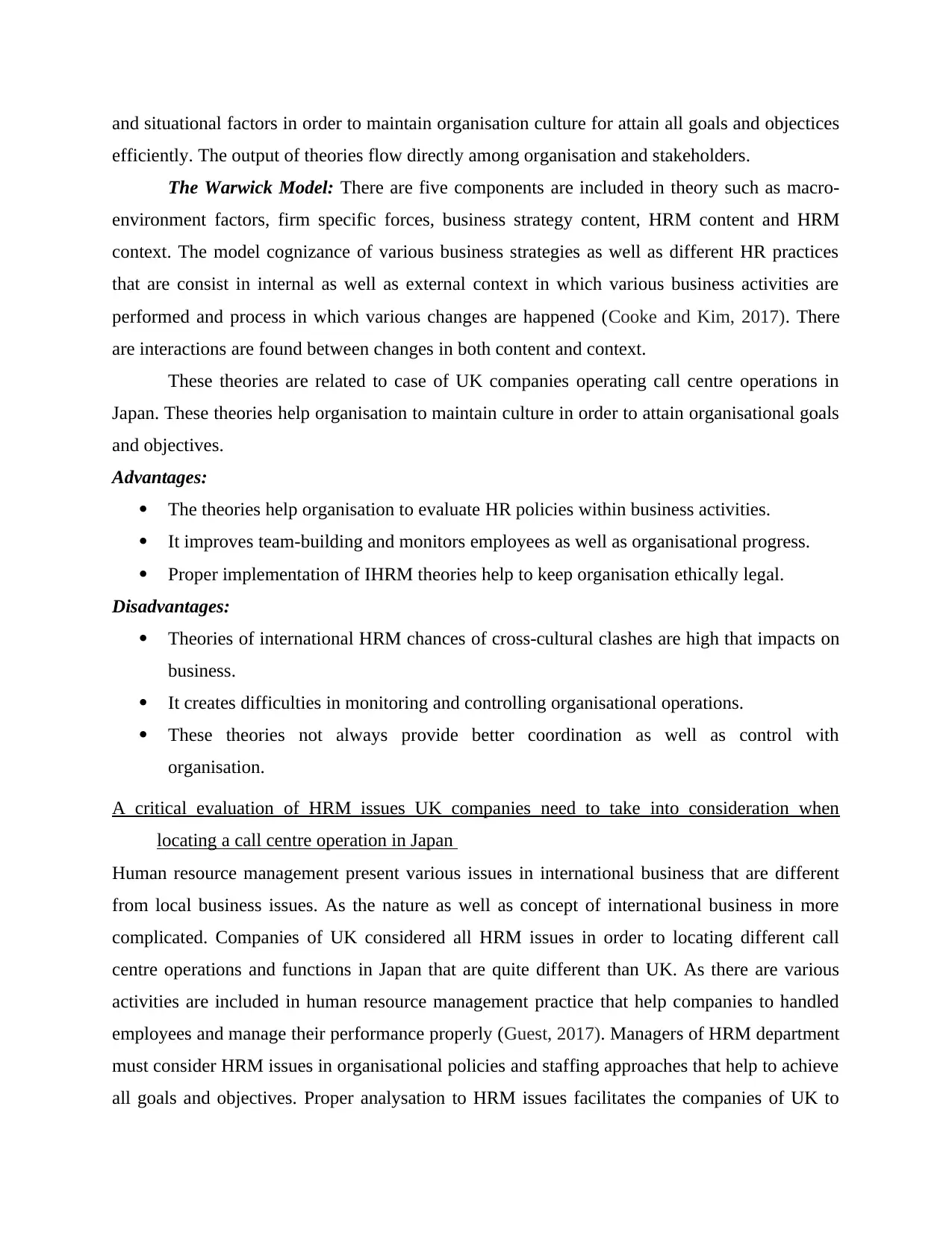
and situational factors in order to maintain organisation culture for attain all goals and objectices
efficiently. The output of theories flow directly among organisation and stakeholders.
The Warwick Model: There are five components are included in theory such as macro-
environment factors, firm specific forces, business strategy content, HRM content and HRM
context. The model cognizance of various business strategies as well as different HR practices
that are consist in internal as well as external context in which various business activities are
performed and process in which various changes are happened (Cooke and Kim, 2017). There
are interactions are found between changes in both content and context.
These theories are related to case of UK companies operating call centre operations in
Japan. These theories help organisation to maintain culture in order to attain organisational goals
and objectives.
Advantages:
The theories help organisation to evaluate HR policies within business activities.
It improves team-building and monitors employees as well as organisational progress.
Proper implementation of IHRM theories help to keep organisation ethically legal.
Disadvantages:
Theories of international HRM chances of cross-cultural clashes are high that impacts on
business.
It creates difficulties in monitoring and controlling organisational operations.
These theories not always provide better coordination as well as control with
organisation.
A critical evaluation of HRM issues UK companies need to take into consideration when
locating a call centre operation in Japan
Human resource management present various issues in international business that are different
from local business issues. As the nature as well as concept of international business in more
complicated. Companies of UK considered all HRM issues in order to locating different call
centre operations and functions in Japan that are quite different than UK. As there are various
activities are included in human resource management practice that help companies to handled
employees and manage their performance properly (Guest, 2017). Managers of HRM department
must consider HRM issues in organisational policies and staffing approaches that help to achieve
all goals and objectives. Proper analysation to HRM issues facilitates the companies of UK to
efficiently. The output of theories flow directly among organisation and stakeholders.
The Warwick Model: There are five components are included in theory such as macro-
environment factors, firm specific forces, business strategy content, HRM content and HRM
context. The model cognizance of various business strategies as well as different HR practices
that are consist in internal as well as external context in which various business activities are
performed and process in which various changes are happened (Cooke and Kim, 2017). There
are interactions are found between changes in both content and context.
These theories are related to case of UK companies operating call centre operations in
Japan. These theories help organisation to maintain culture in order to attain organisational goals
and objectives.
Advantages:
The theories help organisation to evaluate HR policies within business activities.
It improves team-building and monitors employees as well as organisational progress.
Proper implementation of IHRM theories help to keep organisation ethically legal.
Disadvantages:
Theories of international HRM chances of cross-cultural clashes are high that impacts on
business.
It creates difficulties in monitoring and controlling organisational operations.
These theories not always provide better coordination as well as control with
organisation.
A critical evaluation of HRM issues UK companies need to take into consideration when
locating a call centre operation in Japan
Human resource management present various issues in international business that are different
from local business issues. As the nature as well as concept of international business in more
complicated. Companies of UK considered all HRM issues in order to locating different call
centre operations and functions in Japan that are quite different than UK. As there are various
activities are included in human resource management practice that help companies to handled
employees and manage their performance properly (Guest, 2017). Managers of HRM department
must consider HRM issues in organisational policies and staffing approaches that help to achieve
all goals and objectives. Proper analysation to HRM issues facilitates the companies of UK to
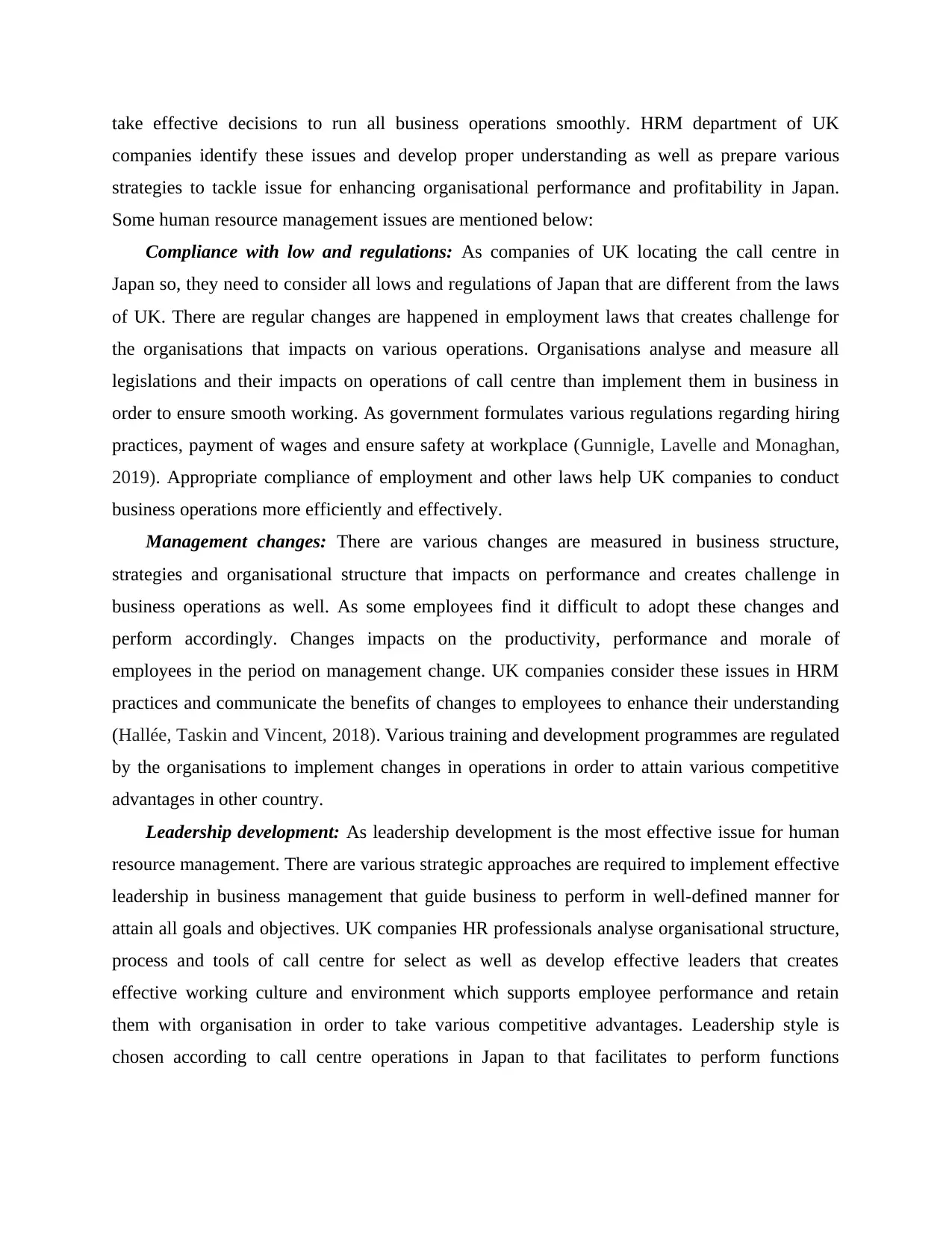
take effective decisions to run all business operations smoothly. HRM department of UK
companies identify these issues and develop proper understanding as well as prepare various
strategies to tackle issue for enhancing organisational performance and profitability in Japan.
Some human resource management issues are mentioned below:
Compliance with low and regulations: As companies of UK locating the call centre in
Japan so, they need to consider all lows and regulations of Japan that are different from the laws
of UK. There are regular changes are happened in employment laws that creates challenge for
the organisations that impacts on various operations. Organisations analyse and measure all
legislations and their impacts on operations of call centre than implement them in business in
order to ensure smooth working. As government formulates various regulations regarding hiring
practices, payment of wages and ensure safety at workplace (Gunnigle, Lavelle and Monaghan,
2019). Appropriate compliance of employment and other laws help UK companies to conduct
business operations more efficiently and effectively.
Management changes: There are various changes are measured in business structure,
strategies and organisational structure that impacts on performance and creates challenge in
business operations as well. As some employees find it difficult to adopt these changes and
perform accordingly. Changes impacts on the productivity, performance and morale of
employees in the period on management change. UK companies consider these issues in HRM
practices and communicate the benefits of changes to employees to enhance their understanding
(Hallée, Taskin and Vincent, 2018). Various training and development programmes are regulated
by the organisations to implement changes in operations in order to attain various competitive
advantages in other country.
Leadership development: As leadership development is the most effective issue for human
resource management. There are various strategic approaches are required to implement effective
leadership in business management that guide business to perform in well-defined manner for
attain all goals and objectives. UK companies HR professionals analyse organisational structure,
process and tools of call centre for select as well as develop effective leaders that creates
effective working culture and environment which supports employee performance and retain
them with organisation in order to take various competitive advantages. Leadership style is
chosen according to call centre operations in Japan to that facilitates to perform functions
companies identify these issues and develop proper understanding as well as prepare various
strategies to tackle issue for enhancing organisational performance and profitability in Japan.
Some human resource management issues are mentioned below:
Compliance with low and regulations: As companies of UK locating the call centre in
Japan so, they need to consider all lows and regulations of Japan that are different from the laws
of UK. There are regular changes are happened in employment laws that creates challenge for
the organisations that impacts on various operations. Organisations analyse and measure all
legislations and their impacts on operations of call centre than implement them in business in
order to ensure smooth working. As government formulates various regulations regarding hiring
practices, payment of wages and ensure safety at workplace (Gunnigle, Lavelle and Monaghan,
2019). Appropriate compliance of employment and other laws help UK companies to conduct
business operations more efficiently and effectively.
Management changes: There are various changes are measured in business structure,
strategies and organisational structure that impacts on performance and creates challenge in
business operations as well. As some employees find it difficult to adopt these changes and
perform accordingly. Changes impacts on the productivity, performance and morale of
employees in the period on management change. UK companies consider these issues in HRM
practices and communicate the benefits of changes to employees to enhance their understanding
(Hallée, Taskin and Vincent, 2018). Various training and development programmes are regulated
by the organisations to implement changes in operations in order to attain various competitive
advantages in other country.
Leadership development: As leadership development is the most effective issue for human
resource management. There are various strategic approaches are required to implement effective
leadership in business management that guide business to perform in well-defined manner for
attain all goals and objectives. UK companies HR professionals analyse organisational structure,
process and tools of call centre for select as well as develop effective leaders that creates
effective working culture and environment which supports employee performance and retain
them with organisation in order to take various competitive advantages. Leadership style is
chosen according to call centre operations in Japan to that facilitates to perform functions
⊘ This is a preview!⊘
Do you want full access?
Subscribe today to unlock all pages.

Trusted by 1+ million students worldwide
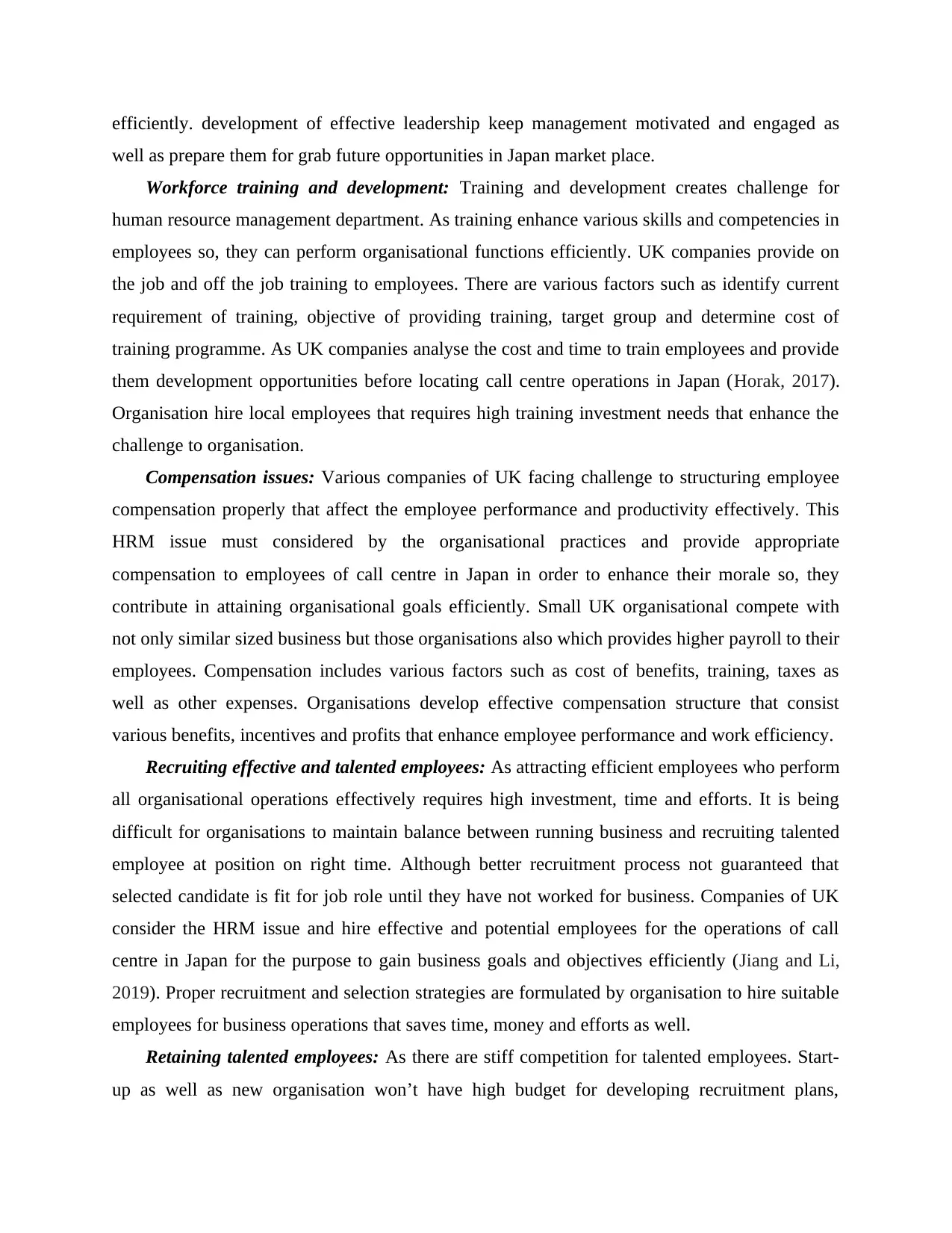
efficiently. development of effective leadership keep management motivated and engaged as
well as prepare them for grab future opportunities in Japan market place.
Workforce training and development: Training and development creates challenge for
human resource management department. As training enhance various skills and competencies in
employees so, they can perform organisational functions efficiently. UK companies provide on
the job and off the job training to employees. There are various factors such as identify current
requirement of training, objective of providing training, target group and determine cost of
training programme. As UK companies analyse the cost and time to train employees and provide
them development opportunities before locating call centre operations in Japan (Horak, 2017).
Organisation hire local employees that requires high training investment needs that enhance the
challenge to organisation.
Compensation issues: Various companies of UK facing challenge to structuring employee
compensation properly that affect the employee performance and productivity effectively. This
HRM issue must considered by the organisational practices and provide appropriate
compensation to employees of call centre in Japan in order to enhance their morale so, they
contribute in attaining organisational goals efficiently. Small UK organisational compete with
not only similar sized business but those organisations also which provides higher payroll to their
employees. Compensation includes various factors such as cost of benefits, training, taxes as
well as other expenses. Organisations develop effective compensation structure that consist
various benefits, incentives and profits that enhance employee performance and work efficiency.
Recruiting effective and talented employees: As attracting efficient employees who perform
all organisational operations effectively requires high investment, time and efforts. It is being
difficult for organisations to maintain balance between running business and recruiting talented
employee at position on right time. Although better recruitment process not guaranteed that
selected candidate is fit for job role until they have not worked for business. Companies of UK
consider the HRM issue and hire effective and potential employees for the operations of call
centre in Japan for the purpose to gain business goals and objectives efficiently (Jiang and Li,
2019). Proper recruitment and selection strategies are formulated by organisation to hire suitable
employees for business operations that saves time, money and efforts as well.
Retaining talented employees: As there are stiff competition for talented employees. Start-
up as well as new organisation won’t have high budget for developing recruitment plans,
well as prepare them for grab future opportunities in Japan market place.
Workforce training and development: Training and development creates challenge for
human resource management department. As training enhance various skills and competencies in
employees so, they can perform organisational functions efficiently. UK companies provide on
the job and off the job training to employees. There are various factors such as identify current
requirement of training, objective of providing training, target group and determine cost of
training programme. As UK companies analyse the cost and time to train employees and provide
them development opportunities before locating call centre operations in Japan (Horak, 2017).
Organisation hire local employees that requires high training investment needs that enhance the
challenge to organisation.
Compensation issues: Various companies of UK facing challenge to structuring employee
compensation properly that affect the employee performance and productivity effectively. This
HRM issue must considered by the organisational practices and provide appropriate
compensation to employees of call centre in Japan in order to enhance their morale so, they
contribute in attaining organisational goals efficiently. Small UK organisational compete with
not only similar sized business but those organisations also which provides higher payroll to their
employees. Compensation includes various factors such as cost of benefits, training, taxes as
well as other expenses. Organisations develop effective compensation structure that consist
various benefits, incentives and profits that enhance employee performance and work efficiency.
Recruiting effective and talented employees: As attracting efficient employees who perform
all organisational operations effectively requires high investment, time and efforts. It is being
difficult for organisations to maintain balance between running business and recruiting talented
employee at position on right time. Although better recruitment process not guaranteed that
selected candidate is fit for job role until they have not worked for business. Companies of UK
consider the HRM issue and hire effective and potential employees for the operations of call
centre in Japan for the purpose to gain business goals and objectives efficiently (Jiang and Li,
2019). Proper recruitment and selection strategies are formulated by organisation to hire suitable
employees for business operations that saves time, money and efforts as well.
Retaining talented employees: As there are stiff competition for talented employees. Start-
up as well as new organisation won’t have high budget for developing recruitment plans,
Paraphrase This Document
Need a fresh take? Get an instant paraphrase of this document with our AI Paraphraser
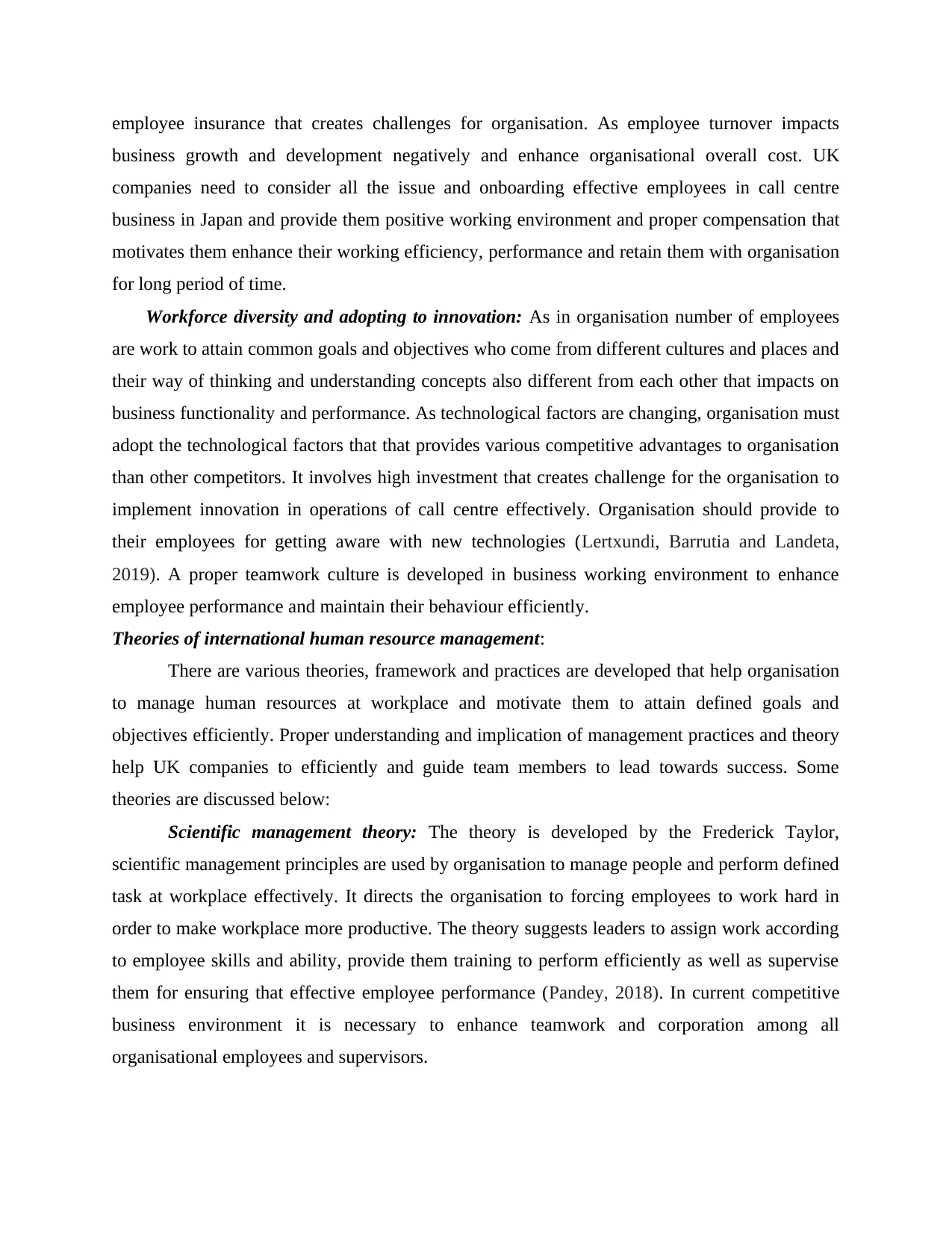
employee insurance that creates challenges for organisation. As employee turnover impacts
business growth and development negatively and enhance organisational overall cost. UK
companies need to consider all the issue and onboarding effective employees in call centre
business in Japan and provide them positive working environment and proper compensation that
motivates them enhance their working efficiency, performance and retain them with organisation
for long period of time.
Workforce diversity and adopting to innovation: As in organisation number of employees
are work to attain common goals and objectives who come from different cultures and places and
their way of thinking and understanding concepts also different from each other that impacts on
business functionality and performance. As technological factors are changing, organisation must
adopt the technological factors that that provides various competitive advantages to organisation
than other competitors. It involves high investment that creates challenge for the organisation to
implement innovation in operations of call centre effectively. Organisation should provide to
their employees for getting aware with new technologies (Lertxundi, Barrutia and Landeta,
2019). A proper teamwork culture is developed in business working environment to enhance
employee performance and maintain their behaviour efficiently.
Theories of international human resource management:
There are various theories, framework and practices are developed that help organisation
to manage human resources at workplace and motivate them to attain defined goals and
objectives efficiently. Proper understanding and implication of management practices and theory
help UK companies to efficiently and guide team members to lead towards success. Some
theories are discussed below:
Scientific management theory: The theory is developed by the Frederick Taylor,
scientific management principles are used by organisation to manage people and perform defined
task at workplace effectively. It directs the organisation to forcing employees to work hard in
order to make workplace more productive. The theory suggests leaders to assign work according
to employee skills and ability, provide them training to perform efficiently as well as supervise
them for ensuring that effective employee performance (Pandey, 2018). In current competitive
business environment it is necessary to enhance teamwork and corporation among all
organisational employees and supervisors.
business growth and development negatively and enhance organisational overall cost. UK
companies need to consider all the issue and onboarding effective employees in call centre
business in Japan and provide them positive working environment and proper compensation that
motivates them enhance their working efficiency, performance and retain them with organisation
for long period of time.
Workforce diversity and adopting to innovation: As in organisation number of employees
are work to attain common goals and objectives who come from different cultures and places and
their way of thinking and understanding concepts also different from each other that impacts on
business functionality and performance. As technological factors are changing, organisation must
adopt the technological factors that that provides various competitive advantages to organisation
than other competitors. It involves high investment that creates challenge for the organisation to
implement innovation in operations of call centre effectively. Organisation should provide to
their employees for getting aware with new technologies (Lertxundi, Barrutia and Landeta,
2019). A proper teamwork culture is developed in business working environment to enhance
employee performance and maintain their behaviour efficiently.
Theories of international human resource management:
There are various theories, framework and practices are developed that help organisation
to manage human resources at workplace and motivate them to attain defined goals and
objectives efficiently. Proper understanding and implication of management practices and theory
help UK companies to efficiently and guide team members to lead towards success. Some
theories are discussed below:
Scientific management theory: The theory is developed by the Frederick Taylor,
scientific management principles are used by organisation to manage people and perform defined
task at workplace effectively. It directs the organisation to forcing employees to work hard in
order to make workplace more productive. The theory suggests leaders to assign work according
to employee skills and ability, provide them training to perform efficiently as well as supervise
them for ensuring that effective employee performance (Pandey, 2018). In current competitive
business environment it is necessary to enhance teamwork and corporation among all
organisational employees and supervisors.
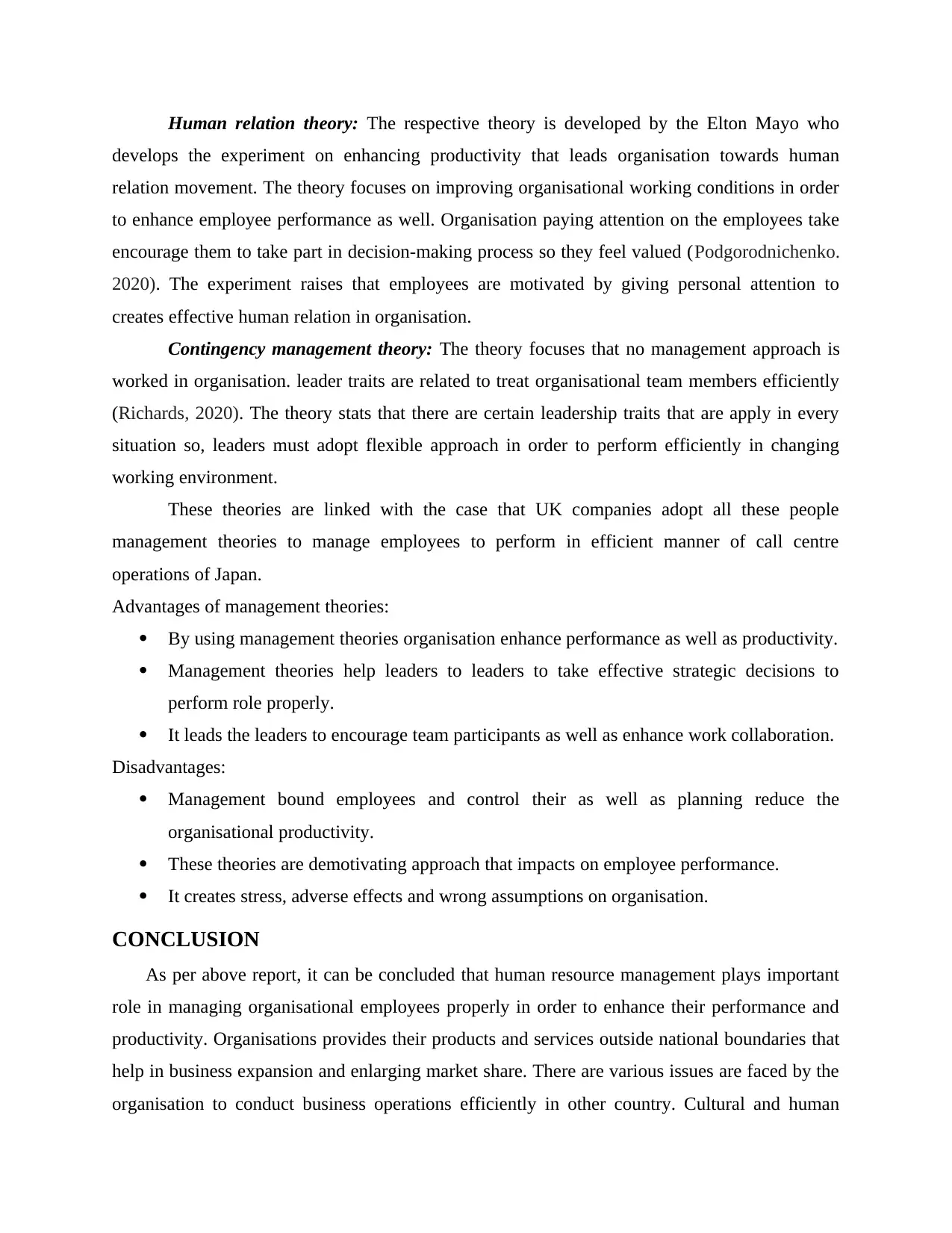
Human relation theory: The respective theory is developed by the Elton Mayo who
develops the experiment on enhancing productivity that leads organisation towards human
relation movement. The theory focuses on improving organisational working conditions in order
to enhance employee performance as well. Organisation paying attention on the employees take
encourage them to take part in decision-making process so they feel valued (Podgorodnichenko.
2020). The experiment raises that employees are motivated by giving personal attention to
creates effective human relation in organisation.
Contingency management theory: The theory focuses that no management approach is
worked in organisation. leader traits are related to treat organisational team members efficiently
(Richards, 2020). The theory stats that there are certain leadership traits that are apply in every
situation so, leaders must adopt flexible approach in order to perform efficiently in changing
working environment.
These theories are linked with the case that UK companies adopt all these people
management theories to manage employees to perform in efficient manner of call centre
operations of Japan.
Advantages of management theories:
By using management theories organisation enhance performance as well as productivity.
Management theories help leaders to leaders to take effective strategic decisions to
perform role properly.
It leads the leaders to encourage team participants as well as enhance work collaboration.
Disadvantages:
Management bound employees and control their as well as planning reduce the
organisational productivity.
These theories are demotivating approach that impacts on employee performance.
It creates stress, adverse effects and wrong assumptions on organisation.
CONCLUSION
As per above report, it can be concluded that human resource management plays important
role in managing organisational employees properly in order to enhance their performance and
productivity. Organisations provides their products and services outside national boundaries that
help in business expansion and enlarging market share. There are various issues are faced by the
organisation to conduct business operations efficiently in other country. Cultural and human
develops the experiment on enhancing productivity that leads organisation towards human
relation movement. The theory focuses on improving organisational working conditions in order
to enhance employee performance as well. Organisation paying attention on the employees take
encourage them to take part in decision-making process so they feel valued (Podgorodnichenko.
2020). The experiment raises that employees are motivated by giving personal attention to
creates effective human relation in organisation.
Contingency management theory: The theory focuses that no management approach is
worked in organisation. leader traits are related to treat organisational team members efficiently
(Richards, 2020). The theory stats that there are certain leadership traits that are apply in every
situation so, leaders must adopt flexible approach in order to perform efficiently in changing
working environment.
These theories are linked with the case that UK companies adopt all these people
management theories to manage employees to perform in efficient manner of call centre
operations of Japan.
Advantages of management theories:
By using management theories organisation enhance performance as well as productivity.
Management theories help leaders to leaders to take effective strategic decisions to
perform role properly.
It leads the leaders to encourage team participants as well as enhance work collaboration.
Disadvantages:
Management bound employees and control their as well as planning reduce the
organisational productivity.
These theories are demotivating approach that impacts on employee performance.
It creates stress, adverse effects and wrong assumptions on organisation.
CONCLUSION
As per above report, it can be concluded that human resource management plays important
role in managing organisational employees properly in order to enhance their performance and
productivity. Organisations provides their products and services outside national boundaries that
help in business expansion and enlarging market share. There are various issues are faced by the
organisation to conduct business operations efficiently in other country. Cultural and human
⊘ This is a preview!⊘
Do you want full access?
Subscribe today to unlock all pages.

Trusted by 1+ million students worldwide
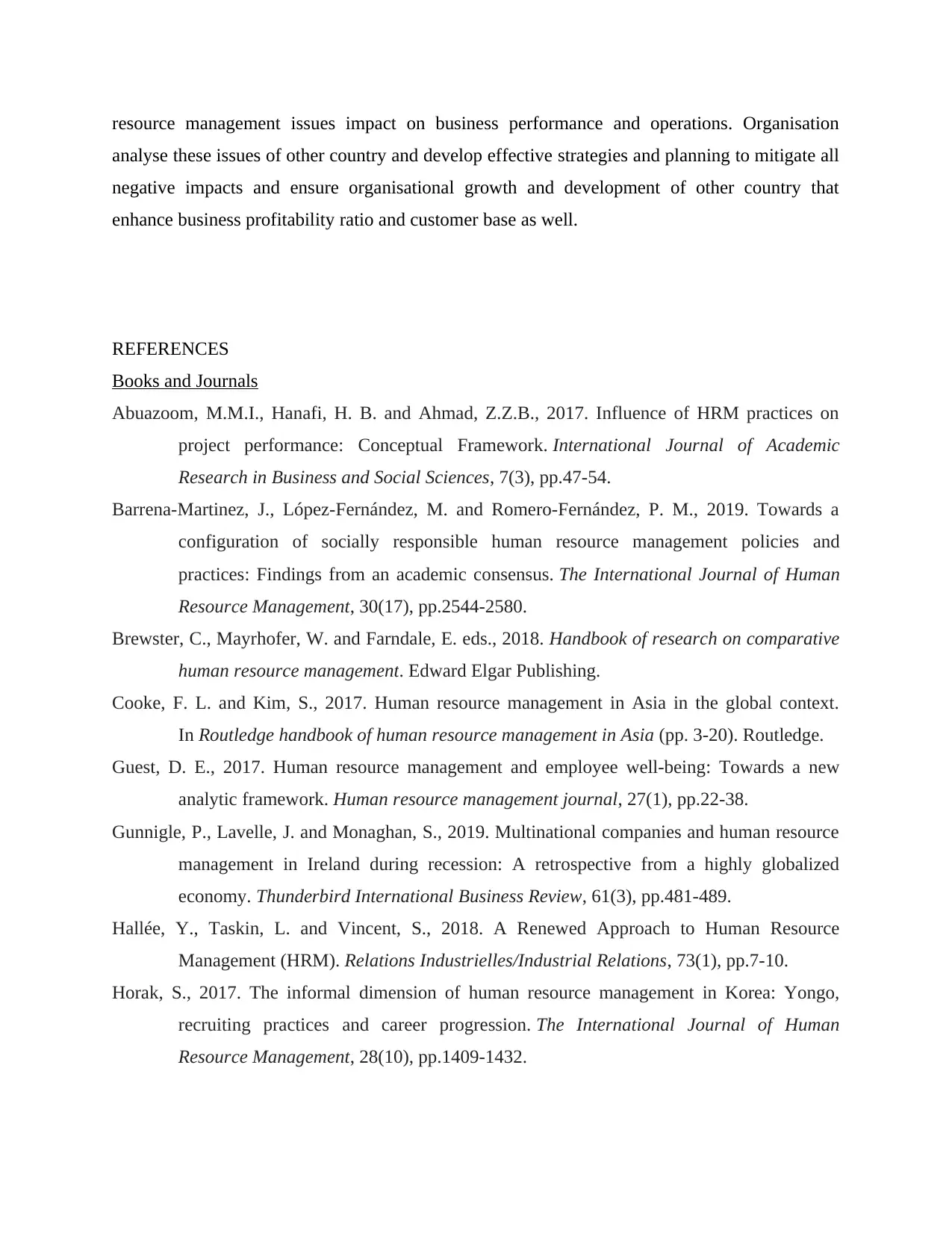
resource management issues impact on business performance and operations. Organisation
analyse these issues of other country and develop effective strategies and planning to mitigate all
negative impacts and ensure organisational growth and development of other country that
enhance business profitability ratio and customer base as well.
REFERENCES
Books and Journals
Abuazoom, M.M.I., Hanafi, H. B. and Ahmad, Z.Z.B., 2017. Influence of HRM practices on
project performance: Conceptual Framework. International Journal of Academic
Research in Business and Social Sciences, 7(3), pp.47-54.
Barrena-Martinez, J., López-Fernández, M. and Romero-Fernández, P. M., 2019. Towards a
configuration of socially responsible human resource management policies and
practices: Findings from an academic consensus. The International Journal of Human
Resource Management, 30(17), pp.2544-2580.
Brewster, C., Mayrhofer, W. and Farndale, E. eds., 2018. Handbook of research on comparative
human resource management. Edward Elgar Publishing.
Cooke, F. L. and Kim, S., 2017. Human resource management in Asia in the global context.
In Routledge handbook of human resource management in Asia (pp. 3-20). Routledge.
Guest, D. E., 2017. Human resource management and employee well‐being: Towards a new
analytic framework. Human resource management journal, 27(1), pp.22-38.
Gunnigle, P., Lavelle, J. and Monaghan, S., 2019. Multinational companies and human resource
management in Ireland during recession: A retrospective from a highly globalized
economy. Thunderbird International Business Review, 61(3), pp.481-489.
Hallée, Y., Taskin, L. and Vincent, S., 2018. A Renewed Approach to Human Resource
Management (HRM). Relations Industrielles/Industrial Relations, 73(1), pp.7-10.
Horak, S., 2017. The informal dimension of human resource management in Korea: Yongo,
recruiting practices and career progression. The International Journal of Human
Resource Management, 28(10), pp.1409-1432.
analyse these issues of other country and develop effective strategies and planning to mitigate all
negative impacts and ensure organisational growth and development of other country that
enhance business profitability ratio and customer base as well.
REFERENCES
Books and Journals
Abuazoom, M.M.I., Hanafi, H. B. and Ahmad, Z.Z.B., 2017. Influence of HRM practices on
project performance: Conceptual Framework. International Journal of Academic
Research in Business and Social Sciences, 7(3), pp.47-54.
Barrena-Martinez, J., López-Fernández, M. and Romero-Fernández, P. M., 2019. Towards a
configuration of socially responsible human resource management policies and
practices: Findings from an academic consensus. The International Journal of Human
Resource Management, 30(17), pp.2544-2580.
Brewster, C., Mayrhofer, W. and Farndale, E. eds., 2018. Handbook of research on comparative
human resource management. Edward Elgar Publishing.
Cooke, F. L. and Kim, S., 2017. Human resource management in Asia in the global context.
In Routledge handbook of human resource management in Asia (pp. 3-20). Routledge.
Guest, D. E., 2017. Human resource management and employee well‐being: Towards a new
analytic framework. Human resource management journal, 27(1), pp.22-38.
Gunnigle, P., Lavelle, J. and Monaghan, S., 2019. Multinational companies and human resource
management in Ireland during recession: A retrospective from a highly globalized
economy. Thunderbird International Business Review, 61(3), pp.481-489.
Hallée, Y., Taskin, L. and Vincent, S., 2018. A Renewed Approach to Human Resource
Management (HRM). Relations Industrielles/Industrial Relations, 73(1), pp.7-10.
Horak, S., 2017. The informal dimension of human resource management in Korea: Yongo,
recruiting practices and career progression. The International Journal of Human
Resource Management, 28(10), pp.1409-1432.
Paraphrase This Document
Need a fresh take? Get an instant paraphrase of this document with our AI Paraphraser
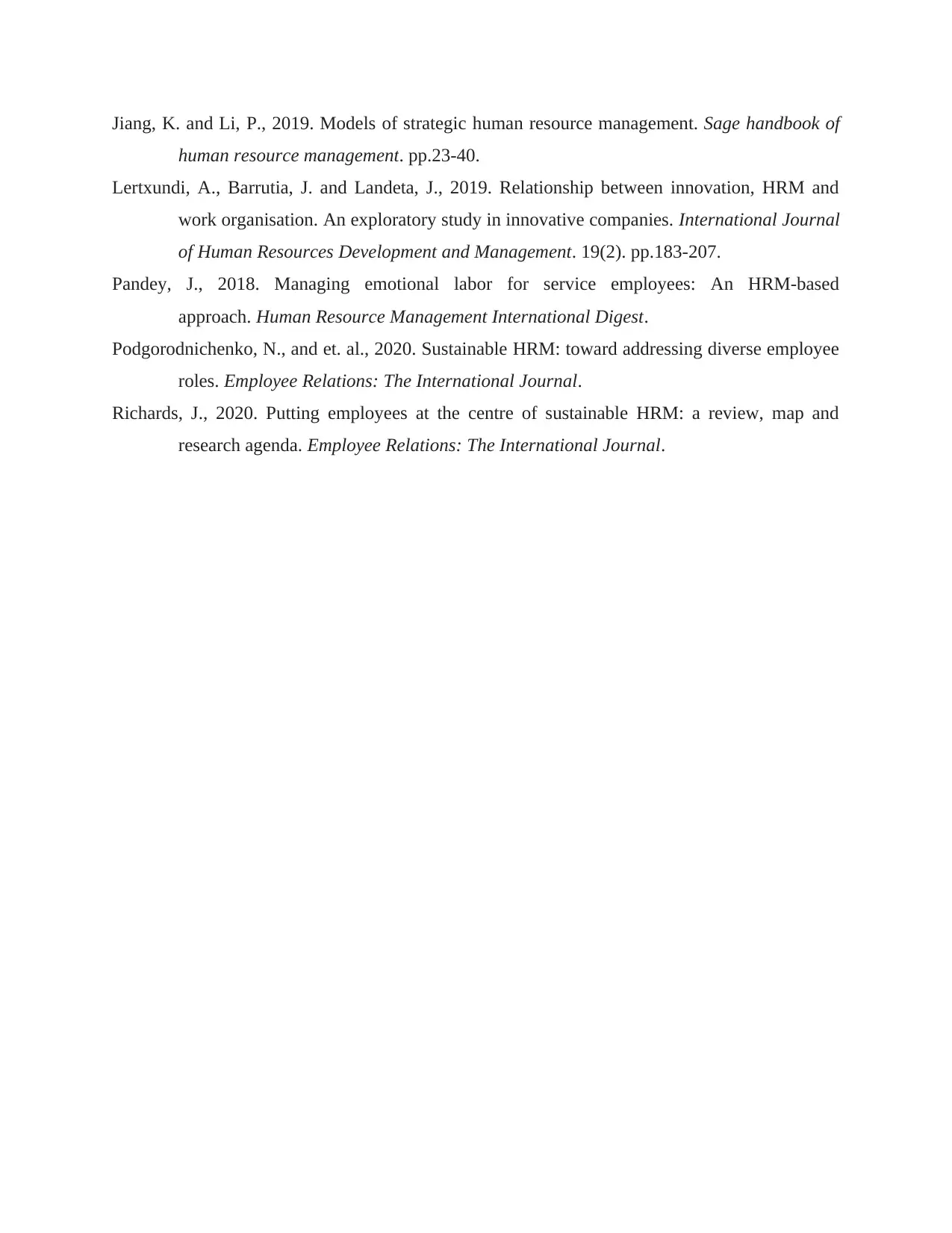
Jiang, K. and Li, P., 2019. Models of strategic human resource management. Sage handbook of
human resource management. pp.23-40.
Lertxundi, A., Barrutia, J. and Landeta, J., 2019. Relationship between innovation, HRM and
work organisation. An exploratory study in innovative companies. International Journal
of Human Resources Development and Management. 19(2). pp.183-207.
Pandey, J., 2018. Managing emotional labor for service employees: An HRM-based
approach. Human Resource Management International Digest.
Podgorodnichenko, N., and et. al., 2020. Sustainable HRM: toward addressing diverse employee
roles. Employee Relations: The International Journal.
Richards, J., 2020. Putting employees at the centre of sustainable HRM: a review, map and
research agenda. Employee Relations: The International Journal.
human resource management. pp.23-40.
Lertxundi, A., Barrutia, J. and Landeta, J., 2019. Relationship between innovation, HRM and
work organisation. An exploratory study in innovative companies. International Journal
of Human Resources Development and Management. 19(2). pp.183-207.
Pandey, J., 2018. Managing emotional labor for service employees: An HRM-based
approach. Human Resource Management International Digest.
Podgorodnichenko, N., and et. al., 2020. Sustainable HRM: toward addressing diverse employee
roles. Employee Relations: The International Journal.
Richards, J., 2020. Putting employees at the centre of sustainable HRM: a review, map and
research agenda. Employee Relations: The International Journal.

⊘ This is a preview!⊘
Do you want full access?
Subscribe today to unlock all pages.

Trusted by 1+ million students worldwide
1 out of 12
Related Documents
Your All-in-One AI-Powered Toolkit for Academic Success.
+13062052269
info@desklib.com
Available 24*7 on WhatsApp / Email
![[object Object]](/_next/static/media/star-bottom.7253800d.svg)
Unlock your academic potential
Copyright © 2020–2025 A2Z Services. All Rights Reserved. Developed and managed by ZUCOL.





